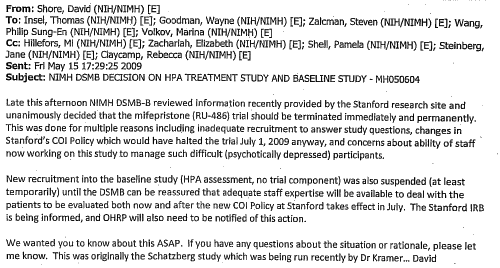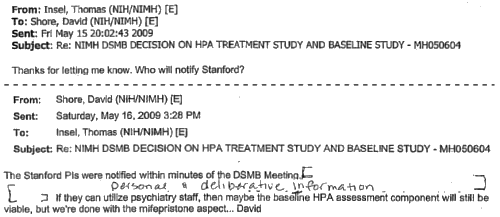 Dr. Alan Schatzberg was Chairman of Psychiatry at Stanford [1991-2010], coeditor of the book Psychopharmacology, and recent past-President of the American Psychiatric Association. From 1998 through 2008, he was the Principle Investigator on NIMH grants studying the use of MIFEPRISTONE [RU-486] in the treatment of Psychiatric Disorders – primarily Psychotic Depression. The relationship between the corticosteriods and Depression has long tantalized researchers – and that relationship remains suggestive but elusive. RU-486 is mainly known as the "morning after" pill – an "abortifactant." It interferes with the action of most of the steroid hormones [progesterone, glucocorticoids, androsteroids]. So the research hypothesis in such a study would be that blocking the effect of the glucocorticoids ["stress hormones"] might improve the lot of the severely depressed. So far, so good.
Dr. Alan Schatzberg was Chairman of Psychiatry at Stanford [1991-2010], coeditor of the book Psychopharmacology, and recent past-President of the American Psychiatric Association. From 1998 through 2008, he was the Principle Investigator on NIMH grants studying the use of MIFEPRISTONE [RU-486] in the treatment of Psychiatric Disorders – primarily Psychotic Depression. The relationship between the corticosteriods and Depression has long tantalized researchers – and that relationship remains suggestive but elusive. RU-486 is mainly known as the "morning after" pill – an "abortifactant." It interferes with the action of most of the steroid hormones [progesterone, glucocorticoids, androsteroids]. So the research hypothesis in such a study would be that blocking the effect of the glucocorticoids ["stress hormones"] might improve the lot of the severely depressed. So far, so good.
 The fly in the ointment? Dr. Schatzberg and Stanford have the patent for RU-486. The patent was turned over to Corcept, a company founded by Dr. Schatzberg to develop its use in depression, aiming toward FDA approval. Both Dr. Schatzberg [$6 M] and Stanford were invested in Corcept [Stanford later sold its stock in 2002]. In the summer of 2008, Senator Chuck Grassley, investigating Conflicts of Interest in Medicine [Psychiatry], began to investigate Stanford and Dr. Schatzberg. Both vigorously denied wrong-doing, but Dr. Schatzberg stepped down from [or was relieved of his position on] this grant. There was much ado about this [for good reason] and Stanford put up a web-site for the relevant documents.
The fly in the ointment? Dr. Schatzberg and Stanford have the patent for RU-486. The patent was turned over to Corcept, a company founded by Dr. Schatzberg to develop its use in depression, aiming toward FDA approval. Both Dr. Schatzberg [$6 M] and Stanford were invested in Corcept [Stanford later sold its stock in 2002]. In the summer of 2008, Senator Chuck Grassley, investigating Conflicts of Interest in Medicine [Psychiatry], began to investigate Stanford and Dr. Schatzberg. Both vigorously denied wrong-doing, but Dr. Schatzberg stepped down from [or was relieved of his position on] this grant. There was much ado about this [for good reason] and Stanford put up a web-site for the relevant documents.
That brings us to today. Two prominent oversight web-sites have posts up about the same thing: Pharmalot [Stanford, Taxpayer-Funded Research & Disclosures] and POGO [The Ugly Underbelly of Medical Research].They point to some recently obtained NIMH emails that reveal that the NIMH DSMB [Data Safety Monitoring Board] met in May 2009 and voted unanimously to shut down Stanford’s MIFEPRISTONE study immediately [and permanently]. The blogs ask why that wasn’t posted on Stanford’s ‘transparency’ web site? Other documents in that same time frame were there. It’s a fine question, but the answer is obvious. Who wants to look that bad? in public?


Being attacked for doing good by those on the outside is something we must all combat with facts as I have in this letter and as Stanford has through its responses to the Senator, but we must also recognize and confront that we have our own internal destructive elements both in our profession and in our organization.
 Schatzberg did the same thing when he lawyered up in response to POGO’s recent expose of his relationship with ghost-writers for his book [with Dr. Charles Nemeroff] Recognition and Treatment of Psychiatric Disorders: A Psychopharmacology Handbook for Primary Care. He seems to think POGO’s Investigator, former Senator Grassley staffer Paul Thacker now with POGO, has a grudge against him. There’s another way to look at that. Paul Thacker is a competent investigator who is out to finally expose the sleazy things Schatzberg has gotten away with for years [I guess it just depends on your point of view]. And I suppose the "internal destructive elements both in our profession and in our organization" are Psychiatrists who are fed up with he and his cohorts perverting the specialty for their own unethical and unscientific ends. I’m proud to throw my lot in with those "elements."
Schatzberg did the same thing when he lawyered up in response to POGO’s recent expose of his relationship with ghost-writers for his book [with Dr. Charles Nemeroff] Recognition and Treatment of Psychiatric Disorders: A Psychopharmacology Handbook for Primary Care. He seems to think POGO’s Investigator, former Senator Grassley staffer Paul Thacker now with POGO, has a grudge against him. There’s another way to look at that. Paul Thacker is a competent investigator who is out to finally expose the sleazy things Schatzberg has gotten away with for years [I guess it just depends on your point of view]. And I suppose the "internal destructive elements both in our profession and in our organization" are Psychiatrists who are fed up with he and his cohorts perverting the specialty for their own unethical and unscientific ends. I’m proud to throw my lot in with those "elements."Drs. Nemeroff and Schatzberg became Chairmen of Psychiatry Departments at the same time [1991]. For almost two decades, they and others shepherded a transformation of Psychiatry that not only allowed the pharmaceutical industry to use academic medicine as a marketing tool, they joined in the fun with their own ventures. And they used NIMH Grant money and their positions in the field to further the interests of their industry affiliates and their own businesses.
Absolutely INCREDIBLE, this stuff is shameful, no wonder people like me lack trust in these so-called KOL’s.
It’s not just KOL’s I have personally lost all respect/trust for; I now question anything medicine tells me. If fact when I see an MD by someones name, The first thing that comes to mind is “who did they sell out too”, not that I can trust them with my health needs.
Medicine has done this to themselves, and they still are burying their heads in the sand; while doing very little of substance to change or hold themselves accountable.
Which Doctor shall I choose, has really become nothing more than Witch Doctor.
[…] favorite quote is here to return us to where this series started [Mifepristone 0: $tanford’s $chatzberg redux…]. Last week, Paul Thacker [now with the Project on Government Oversight] wrote a blog post about […]